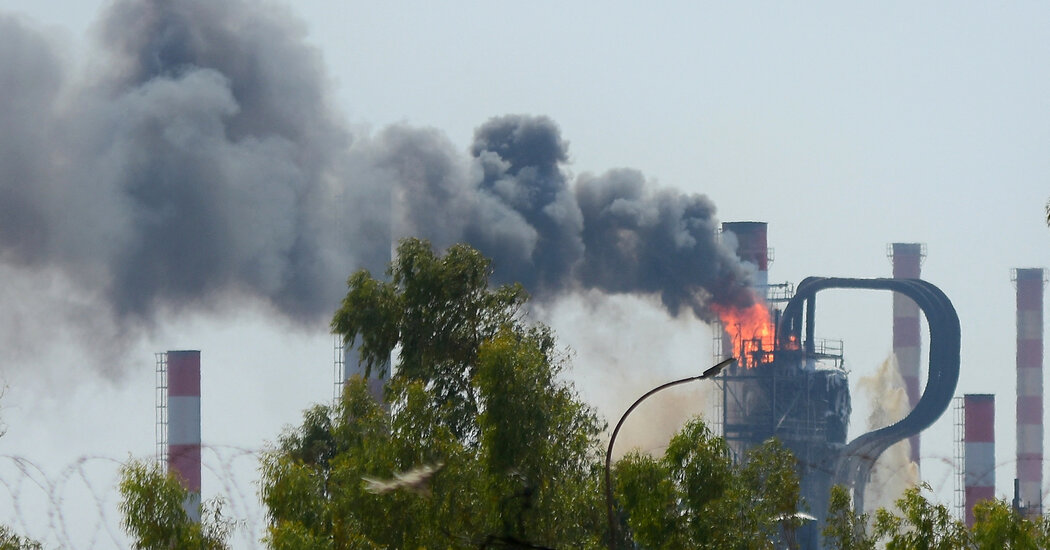For more than two weeks, mysterious explosions and fires have erupted across Iran, setting ablaze apartment complexes and oil refineries, a road outside a major airport and even a shoe factory.
In public, Iranian officials have shrugged off the events as mere coincidence or blamed aging infrastructure, trying to soothe the frayed nerves of a population still traumatized by the country’s war with Israel and the United States in June.
But in private, three Iranian officials, including a member of the country’s powerful Islamic Revolutionary Guards Corps, said they believed that many of them were acts of sabotage.
While Iran’s government has many enemies that would like to see it falter, the officials have trained their suspicions on Israel, pointing to its history of covert operations in Iran, including explosions and assassinations. And after Israel’s 12-day bombing campaign last month in Iran, a senior Israeli intelligence official had vowed to continue operating in Iran.
A European official who deals with Iran said he had also assessed the attacks as sabotage and suspected Israel of involvement, based on its history in Iran — both as a form of psychological warfare and to take out targets. The four officials spoke anonymously because they were not authorized to speak publicly.
The Iranian officials interviewed did not provide evidence to back up their suspicions, and the authorities who spoke publicly cited other causes for the explosions, including gas leaks, garbage fires and old infrastructure. But they have also not given the public a convincing explanation of why gas explosions are occurring at a rate of one to two per day across the country.
Some of the events have occurred at strategic infrastructure sites, like a fire at a major oil producing refinery in the southern city of Abadan on Saturday that killed one person, injured many others and took out a production line. Others, like explosions in apartment buildings and factories, contribute to a sense of chaos and instability.
The Iranian authorities are wary of publicly declaring their suspicions about Israel’s potential involvement because, they said, Iran does not want to corner itself into having to retaliate against Israel.
Iran’s air defense and missile launchers, as well as military bases and nuclear facilities, were badly damaged during last month’s war. Although Iran maintained its ability to launch ballistic missiles into Israel until the last hours before a cease-fire ended the conflict, restarting it risks further weakening Iran’s military abilities.
For more than a decade before the war, Israel and Iran waged their battles in the shadows — by air, land, sea and the cyberworld. Israel for years has carried out covert operations in Iran, including explosions and drone strikes on nuclear and military figures and sites. Iran, in turn, has attacked Israeli-owned ships in the Persian Gulf, launched missiles at structures in Iraq that are linked to Israel and funded and armed militant groups like Hamas in Gaza.
Israeli officials declined requests for comment. But Israel’s intelligence agency, the Mossad, made clear it would continue conducting operations in Iran even after the cease-fire. In June, Mossad’s director made a rare public address to celebrate the agency’s work in Iran, saying, “We will be there, just as we have been up to now.”
Publicly, Iran has sought to explain away the fires. In some cases, such as the blaze in northeast Iran near Mashhad International Airport, Iranian officials said they were conducting “controlled burning of weeds,” and they attributed a fire in Tehran to a garbage fire.
For most of the blazes, however, Iranian officials blamed gas leaks. The director of the Tehran’s fire and public safety departments, Ghodratollah Mohammadi, told state media the cause of these leaks were “worn-out equipment, the use of substandard gas appliances and disregard for safety principles.”
Some of the blasts that hit residential buildings were so powerful, they sent massive plumes of smokes into the air, collapsing the walls and ceilings.
In Qom, one apartment building looked as if a bomb had ripped through it. Walls of a first- floor unit were brought down, their windows shattered. A yellow taxi parked on the street was crushed under rubble, according to videos of the blast published on social media and BBC Persian. The force of the blast, which injured seven people, covered the entire surrounding block in debris.
The unit that exploded, two of the Iranian officials told The New York Times, appeared to have been rented by operatives who had left the building after turning on the stove and oven gas, as if to deliberately spark a blaze.
Another potentially similar case was an explosion in a high-rise compound in Tehran, which offers discounted housing to employees of the judiciary. The explosion blew out walls and windows. The three Iranian officials said they believed that saboteurs might have wanted to stoke panic among judges and prosecutors that they could be targeted, similar to the way Israel previously attacked scientists involved in Iran’s nuclear program.
The Guards member said that the cumulative effect of the near-daily explosions — even if some of them were accidents — was a growing sense of anxiety among both officials and Iranians more broadly.
“The Iranian government’s long record of cover-ups and lack of transparency, along with its vague responses, have only deepened public fear and suspicion,” said Omid Memarian, an Iran expert at DAWN, a Washington-based foreign policy research institute. “People are aware the regime often downplays or denies Israeli attacks.”
With no public acknowledgment of what feels to many Iranian residents like coordinated attacks, some have questioned whether the war ever truly ended.
“A lot of us think that it is Israel’s doing and that war is going to start again,” said a man named Mohammed who runs a cafe and art gallery in the city of Kashan. He asked not to be identified by his full name over fears of repercussions for speaking to foreign news media.
He said he felt “scared and paranoid,” particularly because Kashan, in central Iran, is close to some nuclear sites and missile bases.
Mahdi Mohammadi, a conservative politician and senior adviser to Iran’s head of Parliament, said the situation with Israel was anything but predictable.
“If anyone thinks we are dealing with linear events that we can predict, they are naïve,” Mr. Mohammadi said in one of his regular recorded speeches, which he distributes on Telegram. “We are not even in a cease-fire now; we are in a fragile suspension, and any minute it can end, and we are back at war.”
Many Iranians have also questioned the circumstances of the death last week of Brig. Gen. Gholamhossein Gheybparvar, who was a deputy commander of the Revolutionary Guards and oversaw a military base in Tehran that was in charge of crackdowns on women-led protests in 2021.
According to an announcement of his death on state media, he died of complications from chemical weapons injuries sustained in Iran’s 1980s war with Iraq. The injuries had flared up amid the stress of the recent war with Israel, the announcement said.
Officials have tried various approaches to allay public anxieties.
The national gas company released statistics that it argued showed no notable increase in explosions from gas leaks this year compared with last year’s.
The Tehran City Council invited the gas company and ministry of energy to present reports regarding “recent measures and developments,” which it described as a discussion of the situation under “normal circumstances.”
To cope with the stress, many Iranians have turned to dark comedy. On social media, they have been sharing photoshopped pictures of Israel’s prime minister, Benjamin Netanyahu, wearing the uniform of Iran’s national gas company.
Social media accounts associated with the Israeli government have joined in with cryptic jokes. A “Mossad in Farsi” account, which an official at the agency privately acknowledged as its own, urged Iranians to burn Esphand, a type of incense Iranians traditionally lit to ward off evil spirits and curses.
“Explosion after explosion,” it wrote in another post. “Someone needs to check what’s going on there.”
Sanam Mahoozi contributed reporting.
Farnaz Fassihi is the United Nations bureau chief for The Times, leading coverage of the organization. She also covers Iran and has written about conflict in the Middle East for 15 years.
The post Iranian Officials Suspect Sabotage in String of Mysterious Fires appeared first on New York Times.




